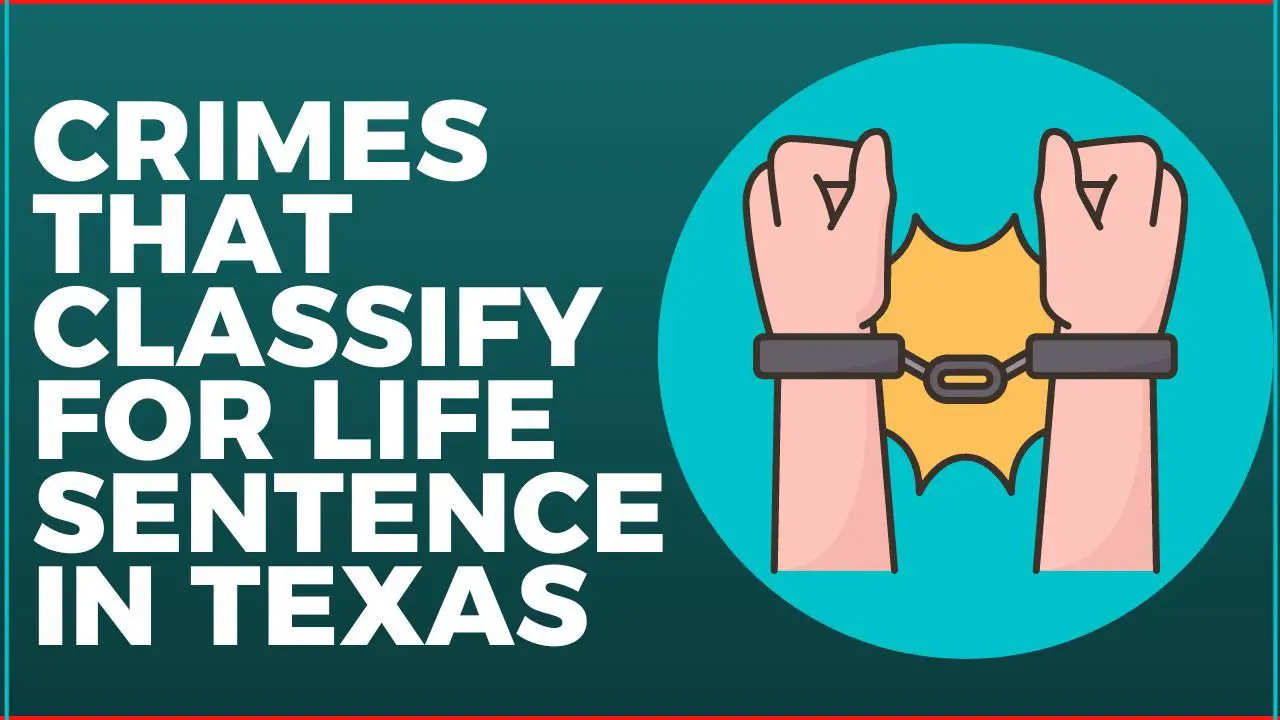5 Crimes That Classify for Life Sentence in Texas
What are some of the crimes that can classify as life sentences in Texas? In this article, we have discussed crimes that classify for life sentences in Texas.

Before discussing how long a life sentence is in Texas, let us discuss what offenses can result in a life sentence. Here is a list of offenses and the punishment discussed under the Texas Penal Code. Note that the Texas Penal Code is a complex document; we are sharing a simple breakdown here;
Offense: First-degree Felonies
Punishment: lifetime imprisonment, ranging from five to ninety-nine years, and a fine under $10,000.
Examples of first-degree felonies are aggravated assault of a government official, sexual assault, kidnapping, robbery, and attempted capital murder. This also includes burglary of a dwelling with the intent to commit a crime, causing a child, senior, or disabled person significant bodily harm, breaking out of custody, murder, instigating a fatal killing, and trafficking of people under 14.
Offense: Second-degree felonies
Punishment: two to twenty years in prison with a potential fine of not more than $10,000
Examples are assault, arson, bribery, escaping arrest in a way someone dies, inappropriate interaction between the teacher and the student, Inappropriate interactions with children, drunk driving murder, murder of a juvenile under 14 through online solicitation, holding between fifty-and two thousand pounds of marijuana, robbery, sexual abuse, stalking, and human trafficking.
Other offenses include third-degree and state jail felonies etc, with a maximum lock-up duration of 10 years, which is not regarded as a life sentence in the state of Texas. So, how long is a typical life sentence in Texas?
How Long is a Life Sentence in the State of Texas:
This is a tough question, given that the federal guidelines are not in place in the state of Texas. However, the duration of a life sentence in the state of Texas depends greatly upon the parole board and the committed crime.
20 years:
This is the most common duration, as 20 years are considered the usual life in the state of Texas. So, if you commit a crime and get sentenced to life in Texas, it means you will serve at least 20 years in prison. Despite the elimination of life without parole terms by the federal government, the majority of federal criminals will serve at least 90% of their sentence in Texas.
Prisoners convicted of capital offenses had a fifteen or twenty-year parole eligibility period before 2005. However, now inmates can only apply for parole after serving a minimum of 40 years in the state of Texas.
25-40 years:
This one is a tough choice. However, the “three strikes” law limits the people who face this 25-year lock-up punishment and ensures that only habitual offenders face it. According to this law, a person must have two prior convictions, both of which must have happened after the current offense. A previous felony conviction will not be counted if two cases overlap.
As discussed, a person who is convicted of a capital offense may face a sentence of 30 or more years, to say the least. Hence, the chances of them going back to the community after 30 years are slim unless the offender has no criminal history.
Unlike other states, Texas does not try juveniles as adults unless they are being convicted for a crime done at legal age. So, while according to federal law, you may not face a mandatory life sentence in the state of Texas, you may still have to serve a 40-year sentence.
Availability of Parole and Life Sentence In Texas State:
While critics argue that life sentences are not productive and rather inhumane, statistics show that criminals do not often reoffend after serving a 20-year sentence or more. Although the federal government has eliminated life without parole sentences, most prisoners spend 90% of their sentence before filing for parole in Texas.
Usually, parole is only available in specific cases, such as if you have not been convicted of a capital crime or have no criminal history. Even then, once you get a life sentence of any of the durations above or more, you can’t apply for parole before serving a minimum of 10 years in Texas.
The best way to ensure that you are granted a chance to apply for parole as soon as possible is to improve your behavior. Steer clear of any trouble inside the prison, whether it is damaging the property or fighting with fellow prisoners.
If someone offers professional counseling or therapy, ensure that you attend it regularly. In short, be on your best behavior, and ensure that the authorities see you as a changed person.
Instances of 40+ Year-Long Life Sentence In the State of Texas:
As untrue as it may sound, the state of Texas has sentenced people to even 50 years of imprisonment. Earlier this year, in September, a 23-year-old man named Kameron Gammage was sentenced to life in prison for killing his 7-month-old son because of anger issues.
In September, a 24-year-old Lewisville man, Cristian Gonzalez, was sentenced to 50 years in prison as a punishment for killing his girlfriend in 2020. Similarly, San Antonio’s 22-year-old Zion Talavera was sentenced to 50 years of imprisonment.
He was accused of being one of the two guys who shot Gemunu Gamarachchilage, 58, the store owner, after various violent robberies in 2019. Gamarachilage was trying to recover for 500 days before finally succumbing to the injuries. Talavera, 18 at the time, was charged with capital murder.
With a previous 20-year sentence for aggravated robbery, he now needs to pay $2 million in restitution.
Such offenders with a history of crimes could only be eligible for parole after serving more than half of their sentence.
Life Sentence in Texas - Worse Than Death?
The harshest penalty for someone found guilty of a major crime in Texas is death. However, many believe that life without parole is a close second and offers fewer legal protections than those who are about to be executed can.
With approximately 56,000 people currently serving it across the country, a 66% increase since 2003, it has also become a much more prevalent punishment. Until a decision is made in writing, courts are expected to proceed as though the state may seek the death sentence in capital murder cases.
Thus, even if the state decides against seeking the death sentence, a defendant will still have access to resources like two attorneys, a mental health expert, an investigator, and more. Hence, the attorneys must be so well-trained and competent that they can handle a capital crime case smartly and ensure that the offender (unless habitual) gets a sentence with a humane duration.
While many are still talking about the rights of offenders, there is not much leniency being shown on official documents concerning life sentences in the state of Texas.
Frequently Asked Questions (FAQ)
Q: Why do judges sentence over 100 years? It might not make sense, as the average human life is less than 100 years, but judges in Texas, US, the reason people get an exceptional amount of imprisonment is to acknowledge various crimes committed by the same person repeatedly.
Q: How long is a three-life sentence in years? A 3 life sentence is actually a judge sentencing someone for consecutive three life sentences. This means if the life sentence is for 20 years, it will be applied to the three years equally.
Q: What is a one-life sentence? A one-life sentence obliges the offender to serve at least 15-25 years in jail before being granted access to parole, which is also subjective to good behavior during imprisonment.
Read more related articles:
- How Do I Write A Letter To Help Someone Get Out Of Prison?
- 9 famous prisons in the state of North Carolina
- 10 Famous Prisons in The State of Delaware
- 10 Famous Prisons in The State of Ohio
- 10 Best Prisons In The State of Ohio
- 10 Famous Prisons In The State of Texas
- Can You Visit Kerobokan Prison?
- How Does an Inmate File Taxes In The US?
- Can You go to Prison for Theft In the United States?
